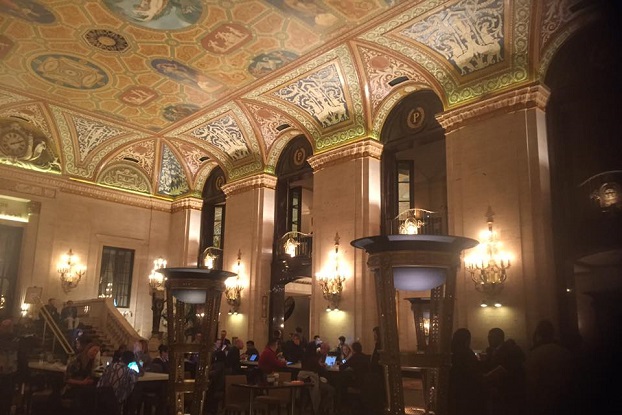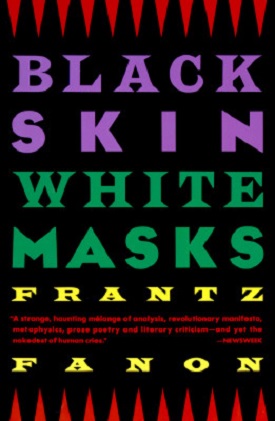
Chandeliers loomed, splashing light against the walls. Men and women wore suits and ties, their heels and shoes reflecting silhouettes. At the bar, some burst out laughing, before lowering their voices, and then whispering. Later in the evening, a jazz band played from the balcony, while everyone sipped on wine and talked.
It was the end of the first day of the 2017 Midwest Political Science Association conference, which is held annually at the Palmer House Hilton in Chicago. I too was dressed up and mixing with the crowd. This year’s MPSA was the third major political science conference I attended and most importantly, the first one in which I presented my research. My presentation had been earlier in the morning, and I was excited from sharing my insights about race and social justice. I felt like I belonged.
My goal in joining a Ph.D. program in Political Science and continuing to be a writer/journalist was to help diversify spaces of power that have traditionally been dominated by the interests of upper class whites. For instance, during the ‘90s, Bill Clinton and his allies relied on social science research to justify cutting money for welfare. Similarly, during the run up to the Iraq War, the mainstream media sided with the Bush administration’s decision to invade Iraq.
In both instances, black and brown populations paid the price. Hence, it became clear to me that more black men, black women, brown women and brown men, and working class white women needed to be in these spaces of power and influence as well. Otherwise, mainstream policies and perspectives would continue to fit the interests of the privileged few.
However, by the second day of the conference, the high of presenting had worn off. I realized that most of the panels were on “safe” topics like examining voter turnout. Deeper discussions about race, class and gender were hard to find.
By the third day, instead of attending the conference, I explored Chicago with my friend who was hosting me. I was trying not to feel powerless but it was delusional not to recognize my reality as a brown face in a sea of white.
“You okay?” my friend asked as we rode the bus from Hyde Park. I knew it was too much to explain. I changed the topic, asking if we could grab coffee. As the late social theorist and revolutionary Frantz Fanon would say, I donned my “mask” and made sure it fit, at least for the remainder of the day.
Bodies Out Of “Place”
 Feeling disengaged and alienated from spaces of power is to be expected, according to sociologist Nirmal Puwar. In Space Invaders: Race, Gender and Bodies Out of Place, Puwar explores the dynamics of race, class and gender within the British Parliament and the civil service.
Feeling disengaged and alienated from spaces of power is to be expected, according to sociologist Nirmal Puwar. In Space Invaders: Race, Gender and Bodies Out of Place, Puwar explores the dynamics of race, class and gender within the British Parliament and the civil service.
She explains that the norms and values on who can be a political leader in the U.K. were created to match the experiences of bourgeois white men. Therefore, for anyone else entering these institutions for the first time, it can feel uncomfortable. And often, people of color are treated as outsiders, no matter how qualified.
“They threaten the status quo,” she writes, “Whether they threaten it, or not, that is what is feared. Their movements, postures and gestures are closely watched for any untoward behaviour.” Gradually, in order to be accepted, black and Asian members of Parliament try to adapt to their surroundings by adopting the language and behavior of those around them.
Personally, as someone who’s been in majority-white newsrooms and academic settings, I too have learned to “blend in” in order for my work to be taken seriously. At conferences, I wear suits. During my time as a full-time reporter, I’d also wear “professional” attire, and make sure my speech didn’t include slang that my colleagues wouldn’t understand.
Many of us make short term sacrifices, such as changing how we behave, to prolong our long-term vision of affecting change. However, there remains the danger that we lose our way and become “co-opted” by the spaces we’re in. As Fanon and others have warned, we become a reflection of the colonizer’s hopes and desires and become complicit in the oppression of others who look like ourselves.
Personal/Political Liberation
Fanon was born and raised in the French colony of Martinique before heading off to France to complete his education and become a therapist. Later, he went to Algeria during its battle for independence from France. What he witnessed reminded him of his experiences in France and during his time growing up, where European ideas of the self, standards of beauty, “knowledge” and thought, had permeated all of society. Fanon recognized that under colonialism, many black and brown peoples accepted the European perspective that their own culture was “primitive” and that to be treated as “human” meant embodying bourgeois European values and beliefs.
 In Black Skin, White Masks, he writes, “All colonized people — in other words, people in whom an inferiority complex has taken root, whose local cultural originality has been committed to the grave — position themselves in relation to the civilizing language: i.e., the metropolitan culture.”
In Black Skin, White Masks, he writes, “All colonized people — in other words, people in whom an inferiority complex has taken root, whose local cultural originality has been committed to the grave — position themselves in relation to the civilizing language: i.e., the metropolitan culture.”
Therefore, Fanon forces us to admit that often what we accept as “knowledge” and the writers and thinkers we are taught to “appreciate” are intended to promote a system which benefits the ruling class/elite. This means that even our most radical ideas lose their edge within spaces of power/influence such as academia since we depend on the colonizer’s language to express them.
A week after sharing my research, my girlfriend and I drove to Jersey City to feel like ourselves again. Jersey City is one of the most diverse places in the country with significant African American, South Asian, and Egyptian populations. The crowd at the waterfront was mostly black and brown and there were a group of older East Asian American women performing a late-night aerobics session.
My girlfriend, who as a teacher is grappling with how to educate students without reproducing the language and beliefs of the colonizer, was relieved to be among sights and sounds with which we could connec. As we gazed at the Manhattan skyline across the Hudson, I too felt happy. However, while driving back, passing empty storefronts and houses with rotted porches and missing windows, I was again reminded of the enormity of what we were up against.
“The truth is we must not accept such conditions” Fanon stated.
After spending time as a therapist for both Algerians and French, Fanon joined the struggle against colonialism. He believed in a revolution that would not only kick out the Europeans but that would also make sure that there would be no types of elites to dominate the rest of society, whether they be white, black or brown. He wanted a society where how we relate and interact with one another was no longer impacted by the cruelty of capitalist and colonial rule.
He writes, “Total liberation involves every facet of the personality.”
A few nights ago, I met with a friend I grew up with, who is also South Asian American and managing life in grad school.
As we walked around our local shopping mall, I spoke about Fanon, since I have been re-reading his work. My friend didn’t know much so I explained some of Fanon’s best ideas, like realizing that we are all connected. And despite the overwhelming odds, Fanon still believed in creating a better world.
For a moment, my friend’s face changed, and I asked if something was wrong.
He paused and chuckled.
“No, I’m fine,” he said, “It’s just…I dunno…that sounds beautiful. What he believed in.”
I agreed, and while heading back to my apartment, a sense of joy spread. But as I got closer to campus, it began to fade. Quickly, I dug my nails into the steering wheel, trying to hold onto the feeling. To hold on as long as I could.
* * *
Sudip Bhattacharya is a Rutgers University Ph.D. student in political science who focuses on race and social justice. He has a Master’s in journalism from Georgetown University. His work has been published at CNN, The Washington City Paper, The Lancaster Newspapers, The Daily Gazette (Schenectady), The Jersey Journal, Media Diversified (Writers of Colour), Reappropriate, AsAm News, The New Engagement, and Gaali Gang.












